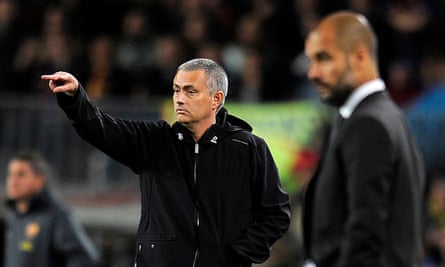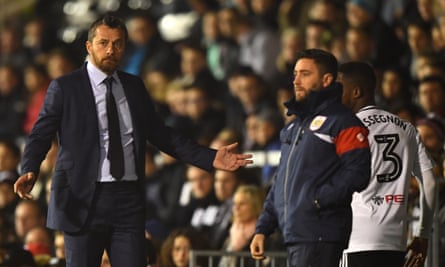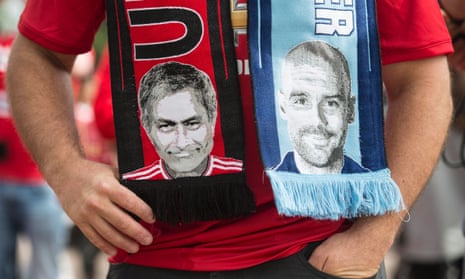It can feel like a trick of the imagination sometimes to remember there was once a time when José Mourinho and Pep Guardiola were comrades. Not friends, perhaps, but certainly allies and close enough that Guardiola saved his future bete noire from a tight spot back in the days before Mourinho, as Real Madrid manager, started referring to Barcelona only as ellos (them).
It’s a great story given what we know now. Barcelona were playing Athletic Bilbao at San Mamés and at full-time Luis Fernández, the home team’s manager, appeared ready to throttle the newly appointed coach who was beside Bobby Robson in the opposition dugout. Mourinho had gone too far with his insults and gestures and curling of the lip. He was surrounded by Basques, with only Luís Figo backing him up, until Guardiola, the Barça captain, suddenly appeared in Fernández’s face.
Guardiola did not use physical force because a man of his status had other means to settle the argument. He simply used his force of personality – the fact he was not just anyone – and the power of eye contact, staring daggers at the Athletic players, daring them to disobey him, before chaperoning Mourinho to the safety of the dressing rooms. “His intervention was achieved with pure charisma,” Paolo Condo, the Italian sportswriter, recalls in The Duellists, his book about the conflict between the two men. “He didn’t raise a hand, he didn’t make any threats, just using the weight of his own leadership.”
Condo was the international correspondent on Gazzetta dello Sport for many years and takes the title of his book from the 1977 film of the same name, Ridley Scott’s directorial debut, featuring the story of two French soldiers, Armand d’Hubert and Gabriel Freud, who had a trivial quarrel that escalated into a lifelong grudge. D’Hubert, like Guardiola, was cold, superior and detached. Feraud was stubborn, hot-tempered and over the top. “Pep is considered to be a figure of perfect sportsmanship, the flawless and fearless knight who offers his hand to his opponent before and after the battle,” the author writes. “Mou, meanwhile, subscribes to the football equivalent of Italian minister Rino Formica’s definition of politics as ‘blood and shit’.”
It’s nicely put, even if there might be a few Manchester United supporters who dispute the follow-up line – “That’s what the fans hunger for” – now Mourinho is going through another of those phases, as he does at every club, where he is picking fights that don’t really exist, walking into press conferences with the expression of an untipped waiter and showing, yet again, why Barcelona rejected him for their manager’s job because, as their former vice-president, Ferran Soriano, now of Manchester City, once wrote, he “generates media conflict almost permanently”.
The latest game of “What’s eating José?” is certainly nothing new and, though he is never an easy man to second-guess, it isn’t the greatest leap of logic to suspect his spiky mood might have something to do with being caught in Manchester City’s wing mirrors and the superlatives that are being attached to the team put together by his old adversary.
Mourinho may have a super‑sized ego but people with immense self‑belief are not immune to occasional insecurities. Or, indeed, jealousy. And, though these are still early days, there isn’t a lot to substantiate Roy Keane’s assertion that City might yet collapse because “it’s in the club’s DNA to mess up”.
The old City, perhaps. Yet Keane appears to be talking about a time when it was Kevin Horlock, not Kevin De Bruyne, in midfield and Alan Ball used to turn up for press conferences clutching a can of cider. These days, the phrase “Typical City” is probably best summed up by the fact they have scored 35 goals in their 10 Premier League fixtures, as well as knocking in four against the Serie A leaders in midweek, and could still greedily add Alexis Sánchez to their forward line in January. Apart from the colour of their shirts and the first letter of their postcode, the modern City feel a long way removed from the days of Jamie Pollock, Bernard Manning, Kappa shirts and Kippax melancholy.

Mourinho’s beef is because, as he sees it, his team have received a disproportionately low amount of praise. His comments in the last few days have made it clear he resents the way Tottenham Hotspur have become darlings of the media. He was desperate to portray Chelsea, a club where he now has few friends, as an ultra‑defensive team after they had sacked him, brought in Antonio Conte and won the league, and that was a classic Mourinho line when he referred to the way Liverpool were built up as “the last wonder of the world”.
The only surprise, perhaps, is that he has not brought City into it and has resisted any of the old urges to start playing with Guardiola’s mind. So far, anyway. We all know what Mourinho is like and, if City continue to shimmer so brilliantly, it surely cannot be long before the bee in his bonnet is buzzing out of control.
To be fair to Mourinho, he does have a point when it comes to his reputation for dull, anaemic football being over‑egged in some quarters. People seem to forget that in a dozen seasons at Porto, Chelsea, Internazionale and Real Madrid his teams finished as the top scorers in their leagues seven times. Or that in three years in Spain he came up against a Barça side who were acclaimed as the most beautifully constructed club team of all time – and outscored them twice. Madrid managed 121 goals for one season, a record for La Liga, and they scored five or more on 11 different occasions in all competitions.
As for boring football at Old Trafford, Mourinho’s critics ought to remind themselves what it was like under Louis van Gaal and the purgatory of watching the most joyless United side for decades. Van Gaal’s team managed 144 shots on target in his final year – on average, 3.8 per game. Mourinho had reached that number by the first week of February last season. The truth, however it is spun, it that Old Trafford, on his watch, has become a much better place to watch football.
Unfortunately for Mourinho, he is never going to shake off the boring tag when, every season, he is so conservative in away fixtures against category A opponents. Mourinho once used Ángel Di María as an auxiliary left-back for Madrid. He lined up with a six-man defence in one game against Chelsea last season – a first for any United manager – and nobody should be surprised if he opts for more of the same at Stamford Bridge on Sunday. These are the games with the biggest television audiences, where opinions are shaped and reputations made, and the bottom line is Mourinho’s only league points from his last 10 away games against top-six sides have been earned in goalless draws. When that changes, maybe he will find people being kinder about his team.
City, on the other hand, have already taken the champions apart and, at the current rate, are on target to finish the season with 133 goals. Yes, it would be unrealistic to think they will not slow down but, to put those figures into perspective, the record in the Premier League is 103, set by Carlo Ancelotti’s Chelsea in 2010, and even in the 42-game era it was 1963 when a top-division team last scored a century of league goals.
City have scored more times in 10 games than they managed throughout the entire 1995-96 season and, almost implausibly, more than half the number, 66, that Kevin Keegan’s Newcastle United side, the team known as the Entertainers, accumulated when they nearly won the title the same year. Arsenal scored 73 times in 2003-04, the year of the Invincibles, and Sir Alex Ferguson’s treble-winning Manchester United side managed 80 in 1998-99. It wasn’t until 29 December, Arsenal’s 19th game, that Arsène Wenger’s history-makers had 35 goals, whereas Guardiola’s side reached that number last Saturday, 28 October. For Ferguson’s most celebrated team, it was 19 December, their 18th fixture.
It doesn’t make City immune to the pressures of leading from the front and it would be foolish, this early, to assume they are simply going to run away with it. But it is a possibility and it really shouldn’t come as a surprise that Mourinho is so cranky right now.
Kline dialled wrong Fulham numbers
Once again, the Championship is keeping to its reputation as the barmiest league in football and one of my favourite stories of 2017 so far comes from the club where the former manager once tried to heal a player’s injury with a slab of cheese.
Perhaps you remember the story in this column a few years ago about Felix Magath sending Fulham’s kitman to the dairy counter of Tesco in New Malden, a short drive along the A3 from the club’s training ground, then telling Brede Hangeland to perch on the edge of a massage table and spend the afternoon in that position with the cheese carefully positioned on the sore spot.
The latest news from Craven Cottage is another insight into professional football in the week that Craig Kline, the American who was brought to Fulham as director of statistical recruitment, was informed he was no longer welcome at the club and responded by calling the police to their training ground.
Kline could be a challenging colleague and had a novel PR strategy when the first stories surfaced about relations being strained with Slavisa Jokanovic, the manager. Kline’s suggestion, I’m reliably informed, was to propose that he dressed up as a sumo wrestler and burst into one of Jokanovic’s press conferences to challenge him to a fight. At which point, the manager would rip off his clothes to show that he, too, was dressed sumo-style. They would grapple for a few minutes in front of the journalists and, according to the logic, this little sketch would go viral and demonstrate they did actually get on. Perhaps unsurprisingly, Jokanovic turned the idea down.
Kline was appointed as a friend of Tony Khan, the son of Fulham’s owner, Shahid Khan, but it isn’t entirely a surprise that it didn’t work out bearing in mind he had no previous experience in football. He had his own statistical system in place to dictate Fulham’s transfer policy, going to great efforts to keep his methodology a secret, and was not shy when it came to telling the other staff that he had the answers.
Yet whatever system he used, it wasn’t flawless. One of the players Jokanovic wanted at the start of last season was a promising young striker from Chelsea’s reserves, only for the idea to be scratched because there wasn’t apparently enough data available. The player’s name? Tammy Abraham, now scoring goals for Swansea City in the Premier League and called up by England.

Fernandes a bit of a tweeter at QPR
The always entertaining Tony Fernandes has just acknowledged in a series of book‑plugging interviews that – let’s put this the polite way – he has often been the kind of chairman every agent wanting to make a quick buck likes to have on speed dial.
At least he has been willing to admit it but I couldn’t help being slightly startled by the response when the man running QPR was asked why he persisted with Twitter.
Yes, he said, he was not sure the club’s PR department liked it. But it was the next sentence, where he talked about it being a modern way to find players, that leapt off the page, bearing in mind Fernandes appeared to be deadly serious. “I’ve had some good tips,” he explained. “We’ve signed players people have pointed out.”
As far as I’m aware, this must be a first in professional football. And, hopefully, a last.

